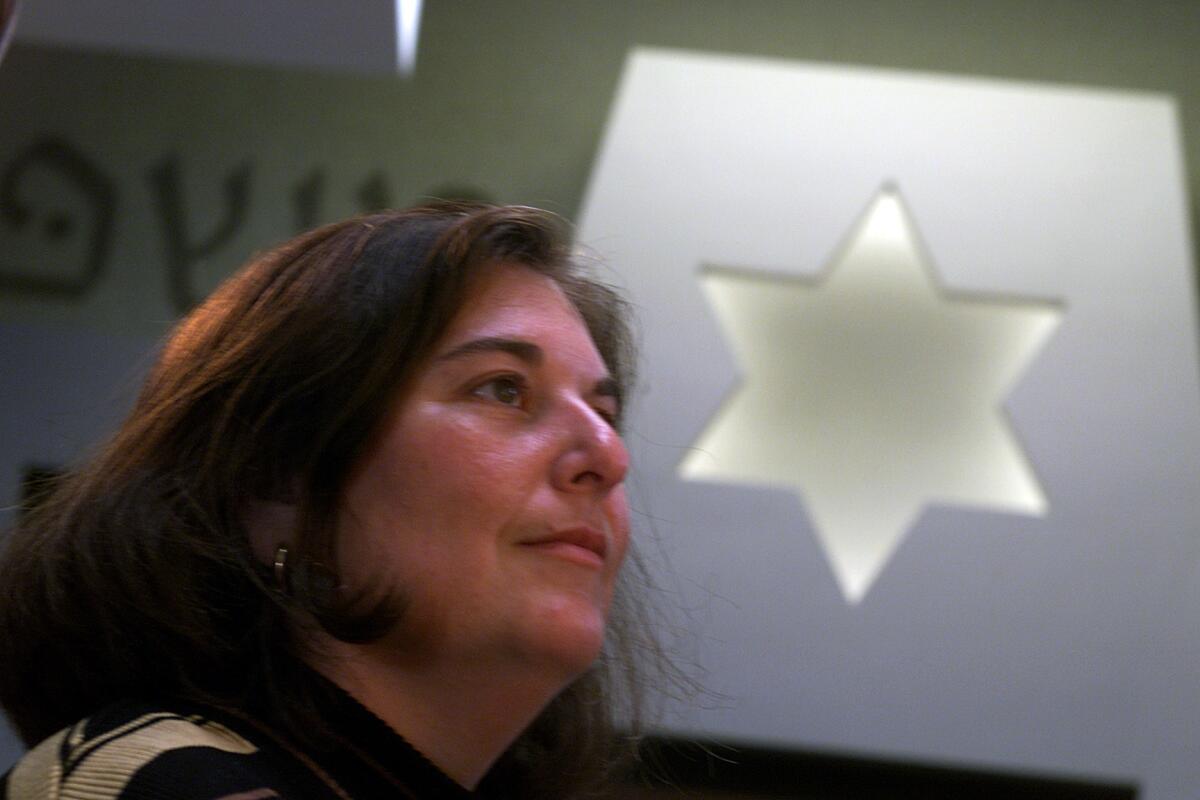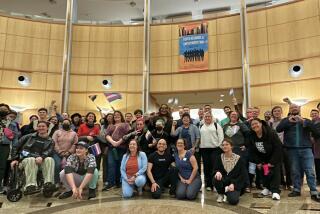In historic move, the largest U.S. branch of Judaism backs transgender rights

Passing the transgender rights resolution “is about inclusion, which is one of the most important Jewish values,” said Rabbi Denise Eger of Congregation Kol Ami in West Hollywood, shown in 2001.
The largest branch of Judaism in the United States passed a far-reaching resolution supporting transgender rights Thursday, the latest step in a year that has seen the issue move from the shadows into the limelight.
At its biennial meeting in Orlando, Fla., members of the Union for Reform Judaism approved the resolution that calls for their congregations and children’s camps to have gender-neutral bathrooms and encourages gender-neutral language. The resolution, which passed on a voice vote, also calls for religious school staffers to receive training on gender issues and urges members to lobby governments on behalf of the transgender community.
Transgender issues have never been more visible or politically controversial. This year, celebrities such as Caitlyn Jenner have come out as transgender, propelling the issue into the mainstream media and national conversation.
NEWSLETTER: Get the day’s top headlines from Times Editor Davan Maharaj >>
Just this week in Houston, 60% of voters rejected a city measure that would have outlawed discrimination against gay and transgender people.
Opponents called it the “bathroom ordinance” and argued that restrooms could be used by everyone regardless of gender.
Bathrooms were not seen as controversial in the nine-point resolution adopted by the Reform Jews.
“This is a very historic resolution,” said Rabbi Denise Eger of Congregation Kol Ami in West Hollywood. Eger is also president of the Central Conference of American Rabbis, with 2,300 members the largest and oldest rabbinical organization in North America. She is the third woman and first lesbian to head the group.
Her congregation has about 300 households, she said. About 60% identify as lesbian, gay, bisexual, transgender or questioning.
“That this passed without a ‘no’ vote shows our overwhelming enthusiasm that we in Reform Judaism have,” she said by telephone from Florida. “It is about inclusion, which is one of the most important Jewish values.”
Other religious bodies, such as the Episcopal Church, the United Church of Christ and the Unitarian Universalist Assn. have approved resolutions affirming equality for transgender and non-gender-conforming people. But none go as far as the one by the Reform Jews, said Michael Toumayan, manager of the Religion and Faith Program at Human Rights Campaign, a civil rights group for gays, lesbians, bisexuals and transgender people.
Reform Judaism represents roughly one-third of the approximately 6 million Jews in the United States, according to a 2013 survey by the Pew Research Center. Orthodox Jews, the most strictly religious, account for about 10%, while Conservatives, theologically located between Orthodox and Reform, represent about 18%.
Reform is seen as the most liberal of the various religious traditions practiced by Jews. The Union of Reform Judaism passed a resolution backing rights of gays and lesbians in 1977. The first transgender rabbi was ordained more than a decade ago.
“This is for us very much an evolutionary process,” said Barbara Weinstein, director of the Commission on Social Action of Reform Judaism, created by the leading bodies of the movement and which prepared the transgender resolution. “We are very proud of our movement welcoming gays and lesbians. This evolution is very much part of that tradition.”
The recommendations in the resolution are voluntary, but Weinstein said she didn’t anticipate any blowback.
“This may be a new issue for some congregations,” she said, “but many are already addressing it. Our congregations are motivated to be as welcoming and inclusive as we can.”
Follow @latimesmuskal for national news.
ALSO:
Holocaust survivors in U.S. say French agreement to pay reparations is long overdue
Officials: Illinois cop killed himself because he feared discovery of crimes
College applications led abducted Alabama boy to learn true ID after 13 years
More to Read
Start your day right
Sign up for Essential California for news, features and recommendations from the L.A. Times and beyond in your inbox six days a week.
You may occasionally receive promotional content from the Los Angeles Times.







